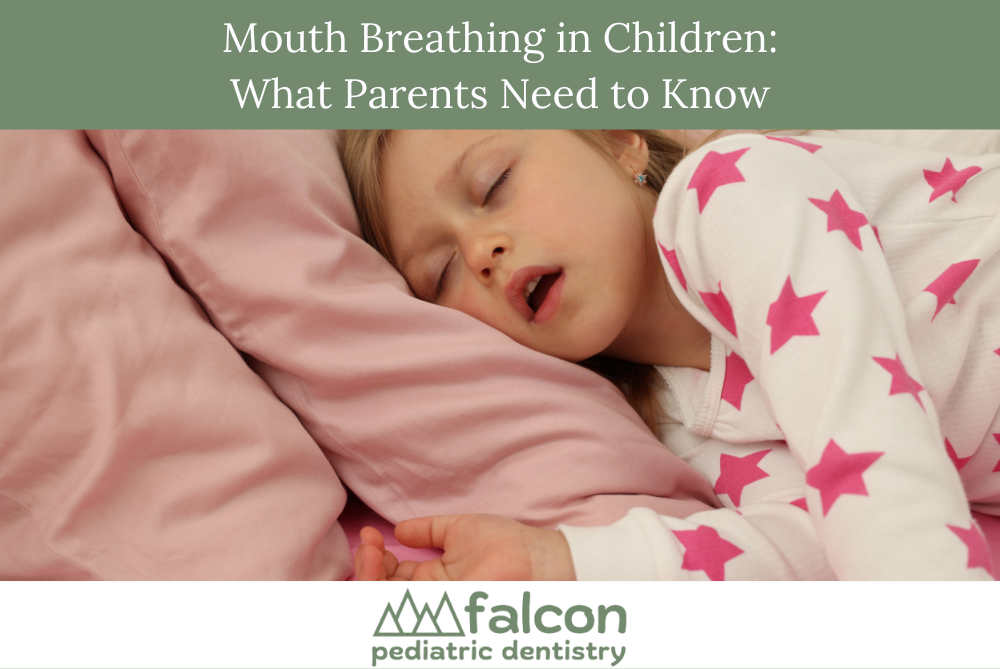
In this blog, we’ll explore why some children breathe through their mouths, what risks are involved, and how early intervention can make a big difference.
What Is Mouth Breathing?
Mouth breathing occurs when a child consistently breathes through their mouth instead of their nose. While occasional mouth breathing—such as during a cold or allergies—is common, chronic mouth breathing is a sign of an underlying issue that needs to be addressed.
Common Causes of Mouth Breathing in Children
- Chronic nasal congestion (from allergies, colds, or sinus infections)
- Enlarged tonsils or adenoids
- Deviated septum or structural nasal issues
- Habitual breathing patterns
- Oral habits like thumb-sucking or prolonged pacifier use
Signs Your Child May Be a Mouth Breather
- Dry lips and mouth
- Snoring or noisy breathing at night
- Frequent waking or poor sleep
- Chronic bad breath
- Long face appearance or open mouth posture
- Difficulty focusing or fatigue during the day
- Dental issues such as crowded teeth or gingivitis
If you notice these signs, it’s important to seek professional evaluation—your child may benefit from early intervention to avoid more serious complications.
How Mouth Breathing Affects Oral and Overall Health
- Dental and Facial Development
- Mouth breathing can lead to narrow jaws, crowded teeth, and open bites.
- It may contribute to an elongated face, recessed chin, or gummy smile.
- Disrupted tongue posture affects how the upper jaw develops.
- Increased Risk of Cavities and Gum Disease
- The mouth becomes dry without regular airflow through the nose, leading to reduced saliva.
- Saliva is essential for washing away bacteria and maintaining a healthy oral environment.
- Poor Sleep Quality and Behavioral Issues
- Children who breathe through their mouths often have fragmented sleep due to airway obstructions.
- This can result in daytime sleepiness, irritability, and difficulty concentrating—sometimes misdiagnosed as ADHD.
- Speech and Swallowing Issues
- Improper oral muscle function from chronic mouth breathing can affect speech clarity and swallowing patterns.
How Falcon Pediatric Dentistry Can Help
At Falcon Pediatric Dentistry, we take a whole-child approach to care. Our team is trained to recognize the signs of mouth breathing and collaborate with other specialists (ENTs, orthodontists, myofunctional therapists) to ensure your child gets the comprehensive care they need.
We evaluate your child’s airway, oral posture, dental development, and overall facial structure during routine visits. Early detection means easier correction and fewer long-term issues.
Q&A: Understanding Mouth Breathing in Kids
Q: Is mouth breathing really that serious?
A: Yes. While it may seem harmless, chronic mouth breathing can lead to dental malformations, sleep issues, and even developmental concerns if left unaddressed.
Q: What age should I start watching for signs of mouth breathing?
A: As early as toddlerhood. If you notice your child breathing through their mouth while awake or asleep, it’s worth discussing at your next dental or pediatric visit.
Q: Can my child outgrow mouth breathing?
A: Sometimes, especially if it’s related to a short-term illness. But if mouth breathing becomes habitual, it’s unlikely they’ll outgrow it without intervention.
Q: What treatments are available?
A: Treatment depends on the cause. Options may include:
- Referral to an ENT for enlarged tonsils or adenoids
- Myofunctional therapy to retrain muscle habits
- Orthodontic evaluation for jaw or bite issues
- Allergy management or nasal obstruction relief
Q: How can I help my child breathe through their nose?
A: Encourage nasal breathing by keeping allergies under control, discouraging thumb-sucking or pacifier use after age 2, and talking to your pediatric dentist about any concerns.
Schedule a Visit Today
If you suspect your child may be a mouth breather or you’re concerned about their oral development, we’re here to help. At Falcon Pediatric Dentistry, we provide compassionate, expert care tailored to your child’s unique needs.
📍 Falcon Pediatric Dentistry
11555 Meridian Market View
Falcon, CO, 80831
📞 Phone: (719) 749-9001
Visit Our Website falconpediatricdentistry.com
Let’s work together to ensure your child grows up with a healthy smile—and a healthy airway, too.
Your child’s smile is just the beginning.
Call us today to schedule an appointment or visit our website to learn more!
